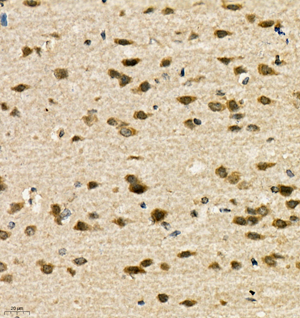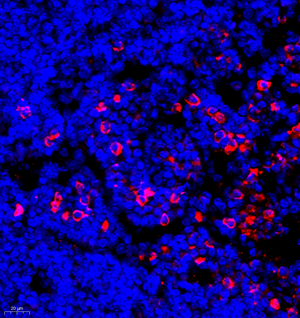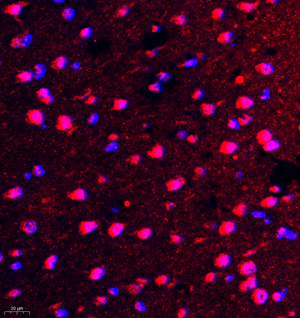| Reactivity: | H |
| Applications: | WB |
| Host Species: | Rabbit |
| Clonality: | Polyclonal |
| Full Name: | eIF4E rabbit polyclonal antibody |
Gene Name: | Eukaryotic translation initiation factor 4E |
Synonyms: | EIF4E, Eukaryotic translation initiation factor 4E, AUTS19, CBP, EIF4E1, EIF4F, eIF-4E |
Immunogen: | Recombinant protein corresponding to Mouse eIF4E |
Isotype: | IgG |
Purity: | Affinity purification |
Subcellular location: | Cytoplasm |
Uniprot ID: | P63073, P63074 |
Product Usage Information
Applications | Species | Dilution | Positive Sample |
IHC/IF | Mouse, Rat | 1: 500-1: 2000 | brain, lymph node |
Background
Eukaryotic translation initiation factor 4E, also known as eIF4E, is a protein that in humans is encoded by the EIF4E gene. eIF4E is involved in directing ribosomes to the cap structure of mRNAs. It is a 24 kD polypeptide that exists as both a free form and as part of the eIF4F pre-initiation complex. Almost all cellular mRNA require eIF4E in order to be translated into protein. The eIF4E polypeptide is the rate-limiting component of the eukaryotic translation apparatus and is involved in the mRNA-ribosome binding step of eukaryotic protein synthesis.
Images
 |
Immunohistochemistry of paraffin embedded mouse brain using eIF4E (GB11565) at dilution of 1:2000 (400x lens) |
|
|
Immunohistochemistry of paraffin embedded rat brain using eIF4E (GB11565) at dilution of 1:2000 (400x lens) |
|
|
Immunofluorescence of paraffin embedded mouse lymph node using eIF4E (GB11565) at dilution of 1:1000 (400x lens) |
|
|
Immunofluorescence of paraffin embedded rat brain using eIF4E (GB11565) at dilution of 1:1000 (400x lens) |
Storage
| Storage | Store at -20°C for one year. Avoid repeated freeze/ thaw cycles. |
| Storage Buffer | PBS with 0.02% sodium azide, 100 μg/ml BSA and 50% glycerol. |



